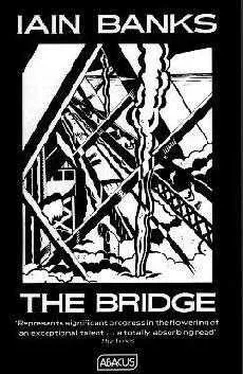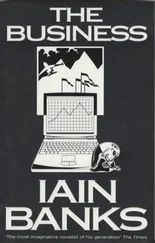Dr Joyce looks at me over his gold-rimmed spectacles. 'Is that it?' he says. I nod.
'Then I wake up.'
'Just like that?' Dr Joyce sounds annoyed. 'No more?'
'End of dream,' I tell him, crisply emphatic.
Dr Joyce looks profoundly unconvinced (I don't blame him really, this is all a pack of lies), and shakes his head in what may well be a gesture of exasperation.
We are standing in the centre of a room with six black walls and no furniture; it is a rackets court, and we are near the end of a game. Dr Joyce - fiftyish, not unfit, but a little puffy - believes in sharing the pursuits of his patients where he can; we both play rackets, so rather than sit in his office we came here for a game. I've been telling him my dream in instalments between points.
Dr Joyce is all pink and grey: grey frizzy hair, pink face, and mottled grey-pink arms and legs poking out from his grey shorts and shirt. His eyes, however, behind the gold-rimmed, chain-secured glasses, are blue: sharp, hard blue and set in his pink face like fragments of glass stuck in a plate of raw meat. He is breathing hard (I am not), perspiring profusely (I only broke sweat in the last point), and looking very suspicious (as I've said, with good reason).
'You wake up ?' he says.
I try to sound as annoyed as I can: 'Damn it man, I can't control what I dream. ' (A lie.)
The doctor issues a professional sigh and uses his fielding-racket to scoop up the ball he missed at the end of the last point. He stares intently at the serving wall. 'You to serve first, Orr,' he says sourly.
I serve, followed by the doctor. Rackets is a game for two players, each with two rackets; a fielding-racket and a shot-racket. It is played in a hexagonal, black-painted court, with two pink balls. This last fact, subjected to the unsubtle allotrope of humour which passes for wit on the bridge, has resulted in rackets being known as 'the man's game'. Dr Joyce knows the game better than I do, but he is shorter, heavier, older and less well co-ordinated. I have been playing the game for only six months (my physiotherapist recommended it), but I win the point - and the game - easily enough, fielding one ball while the doctor fumbles the other. He stands, panting, glaring at me, a very picture of pink pique. 'You're sure there's no more?' he says.
'Positive,' I tell him.
Dr Joyce is my dream doctor. He specialises in the analysis of dreams and believes that by analysing mine he will be able to discover more about me than I am able to tell him through any conscious effort (I am an amnesiac). Using whatever he finds by this method, he then hopes somehow to jog my delinquent memory back into action: hoopla! With one mighty leap of the imagination I shall be free. I have been doing my honest best to co-operate with him in this noble venture for over half a year now, but my dreams have always been either too vague to be accurately recalled, or too banal to be worth analysing. In the end, not wanting to disappoint the increasingly frustrated doctor, I have resorted to inventing a dream. I rather hoped my dream of the sealed carriages would give Dr Joyce something to get his yellow-grey teeth into, but from his peeved look and belligerent stance, I get the impression that this is not the case.
He says, 'Thanks for the game.'
'My pleasure.' I smile.
In the showers, Dr Joyce hits below the belt.
'Your, ah, libido, Orr. Quite normal?' He soaps his paunch; I am rubbing foamy circles on my chest.
'Yes, doctor. How's yours?' The good doctor looks away.
'I was asking in a professional capacity,' he explains. 'Wejust thought there might be some problems. If you're sure...' His voice trails away, and he steps under the stream of water to rinse off.
What does the good doctor want? References?
Showered and changed, and after a call at the rackets club bar, we take an elevator to the level where Dr Joyce's consulting rooms are. The doctor looks more at home in his grey suit and pink tie, but he is sweating still. I feel refreshed and cool in trousers, silk shirt, waistcoat and frock coat (carried over one arm for now). The elevator - soft class: leather seats, pot plants - hums as it climbs. Dr Joyce goes to sit down on a bench by one wall, near the attendant, who is reading a paper. The doctor takes out a slightly off-white handkerchief and mops his brow.
'So, what do you think this dream means then, Orr?'
I look at the newspaper-reading attendant. We three are the only people in the lift, but I would have imagined that even a lift-boy's presence would be sufficient to prohibit what I thought was meant to be a confidential exchange. That was why we were heading for the good doctor's office. I stare round at the elevator's wooden panelling, leather furniture and rather unimaginative seascape prints (and decide that I prefer lifts with outside views).
'I've no idea,' I say. Once - I seem to remember - I thought that what my dreams meant was exactly what Dr Joyce was supposed to tell me, but the good doctor disabused me of this notion some time ago, while I was still struggling to have dreams meaningful enough for him to get to work on.
'But that's just it,' Dr Joyce says wearily, 'you probably do know.'
'But I don't want to tell you?' I suggest.
Dr Joyce shakes his head. 'No, you probably can't tell me.'
'So why ask?'
The elevator is slowing to a stop. The doctor's offices are about midway up the top half of the bridge, equidistant from the always steam-wreathed train deck and one of the often cloud-entangled summits of the great edifice. A man of no little influence, his offices are on the outside of the main structure with one of those much sought after sea views. We wait for the doors to open.
'What you have to ask yourself, Orr,' Dr Joyce says, 'is what this sort of dream means in relation to the bridge .'
I look at him. 'The bridge?'
'Yes,' he nods.
'You've lost me,' I tell him. 'I don't sec what possible connection there can be between the bridge and my dream.'
Another doctorly shrug. 'Perhaps the dream is a bridge,' he muses as the inner doors slide back. He takes out his travel-pass to show the attendant; 'Perhaps the bridge is a dream.'
(Well, that's a great help.) I show the attendant my hospital identity bracelet, then follow the good doctor along a broad, carpeted corridor to his offices.
The identity bracelet on my right wrist is a plastic strap which contains some sort of electronic device detailing my name and residence. It describes the nature of my affliction, the treatment I am undergoing, and the name of my doctor. Printed on the plastic strap is my name: John Orr. This is not really my name; it is the name I was given by the bridge's hospital authorities when I arrived here. 'John' because it is a common, inoffensive name, 'Orr' because when I was fished out of the waters surging around one of the bridge's great granite piers, there was a large, livid, circular bruise on my chest, an almost perfect circle stamped on my flesh (and beyond; I had six broken ribs). It looked like an O. 'Orr' was the first name starting with an O that occurred to the nurses charged with looking after me; it is they who are by tradition allowed to name foundlings, and as I was discovered without any form of identification this definition was extended to myself.
My chest, I might add, still aches on occasion, as if that curious, unexplained, mark remained there in all its multicoloured splendour. I need hardly add that I had also received head injuries, originally presumed to be the cause of my amnesia. Dr Joyce is inclined to attribute the ache which I experience in my chest to the same trauma which caused my amnesia. He believes my inability to remember my past life.was caused not so much by the head injuries I received as by some other, perhaps linked, psychological shock, and that the answer to the question my amnesia poses is to be found in my dreams. This is why he's taken me on: I am an Interesting Case, a challenge. He will discover my past for me, no matter how long it takes.
Читать дальше












